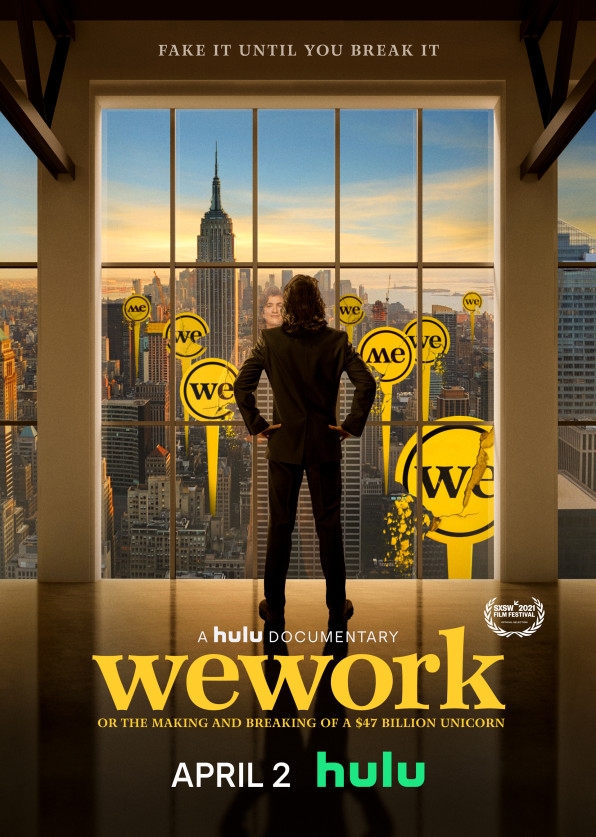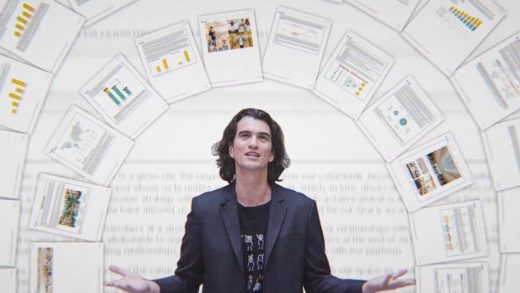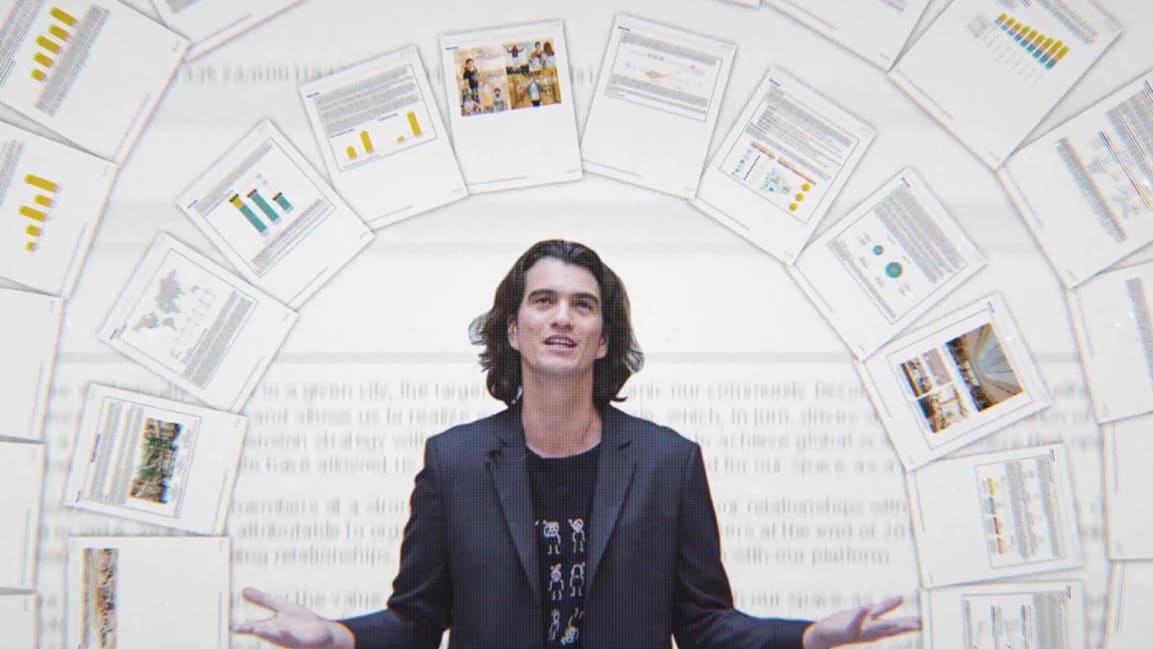Hulu’s WeWork doc tries to recapture the energy of the 2019 saga
In fall 2019, the story of WeWork’s Icarian plummet—from the startup destined to change the way we work and live to the laughing stock of Wall Street—played out with all the drama you’d expect when at its center are a messianic CEO and a Japanese billionaire enabling his reckless whims.
As you may recall, former WeWork CEO Adam Neumann had a vision of creating a culture of communal workspaces that was turbocharged by SoftBank CEO Masayoshi Son investing more than $10 billion in WeWork with a mandate to Neumann to think bigger. WeWork soared to a $47 billion valuation and was on the precipice of going public until its prospectus raised a sea of red flags—from the company reporting $900 million in losses and $47 billion in lease obligations to Neumann’s wife, Rebekah, being granted the power to name his successor should anything happen to him.
It was a tale of staggering hubris, lavish excess, and toxic leadership that became catnip for a storm of media coverage.
Indeed, in today’s insatiable market for content for video streaming and on-demand audio, the WeWork saga inspired a flurry of deals to turn this story into tragedy, farce, or a bit of both. Last year there was Wondery’s deep-dive podcast miniseries WeCrashed, and New York Magazine contributor Reeves Wiedeman published the book Billion Dollar Loser.
Yet to come is the book The Cult of We from Wall Street Journal reporters Maureen Farrell and Eliot Brown, which is being adapted into a limited series with Succession breakout star Nicholas Braun. Another forthcoming book, about SoftBank, from Fast Company contributor Katrina Booker, was fast-tracked for a TV series from Blumhouse. An Apple TV Plus limited series starring Jared Leto and Anne Hathaway as the Neumanns has also been announced.
Amid the frothy markets for both content and stocks comes Hulu’s documentary WeWork: Or the Making and Breaking of a $47 Billion Unicorn.
Director Jed Rothstein (The China Hustle) had the task of not just laying out the spectacular rise and fall of Neumann, but also finding a new way into a story that has (and will be) picked apart from nearly every conceivable angle. Add to that the fact that WeWork’s odyssey already seems like a relic of a bygone era. It’s odd to say given that it was less than two years ago. But, oh, what a two years it’s been. In the business world, alone, everything—from GameStop’s stock mayhem to nonfungible tokens generating blockbuster paydays (and a possible bubble set to burst) to the frenzy over electric vehicles that ultimately led to Volkswagen’s April Fools’ fumble—has been more over-the-top ridiculous than WeWork ever was.
Given that we seem to be getting a “This should be a movie!” story with ever greater frequency, is it possible to recapture that lightning-in-a-bottle moment with something like WeWork?

[Photo: courtesy of Hulu]
“I think what a film can do is connect us with people and their stories in a way that forms a deeper bond and allows us to think about things with a little more distance,” Rothstein says. “We don’t do that anymore. We don’t allow ourselves time to think. We just react to everything. And I think there is some value in taking a breath, letting something sink into you a little more, and thinking about it more deeply, and maybe coming up with more effective and more profound answers to the questions we’re facing.”
Rothstein’s way into the WeWork drama was to focus more on the people in Neumann’s circle who bought into his vision of changing not just workplace culture, but the world itself.
Sources in the documentary include a filmmaker who moved into a WeLive building, WeWork’s brand of communal living spaces, and found himself slowly distanced from the outside world. There’s Neumann’s ex-assistant, who moved to New York City to find her purpose and thought she did so when she met Neumann, as well as a number of other ex-employees who were also swept up in Neumann’s preaching of “we,” until they were laid off in the thousands.
“I was intrigued by the broader human story behind it,” Rothstein says. “While the financial fable of the company was certainly a spine for the story and was a compelling thing to follow, there hadn’t been a lot of flesh put on the bones in terms of emotionally and narratively understanding what this phenomenon meant for the many other people who went through it.”

Rothstein also wanted to underscore his personal belief in Neumann’s vision of building communal workspaces, something he feels may have been overlooked in the sheer collapse of Neumann’s ambitions.
“By the time [WeWork] started after the [2008] recession, work life had changed, especially in New York where they started,” says Rothstein, who’s based in Brooklyn. “A lot of the bonds that held people together historically in America, like working at one company for a long time or being part of church groups, had eroded. So we were much more of these solo independent operators bouncing from one thing to the next.
“I think that deprived us of these types of casual community relationships that actually are the bonds of life and that make life really rich,” he adds. “WeWork hit on the need to try and re-create that in a way.”
Indeed, there’s an emotional coda to WeWork, from Neumann’s ex-assistant explaining how during the COVID-19 pandemic, in which the documentary was filmed, she feels the need for community even more with stay-at-home and social distancing mandates in place. Rothstein’s strategic use of behind-the-scenes footage of Neumann and candid testimonies from sources also work well in the doc’s favor.
The WeWork story feels like a natural fit for a streaming service, as it is one that’s already proven its ability to capture the nation’s attention. Yet there is an inescapable feeling of staleness that colors the WeWork story overall. With our attention span being ever-more truncated, there can be the issue of a story’s fizz going flat.
Rothstein argues that because the media was obsessed and then moved on, there are more people yet to discover the wonders of We. “The media circles you’re in, and that I’m in in some ways, we’ve plumbed this a bit more. But I don’t know that in the general public that fizz has even passed through their radar very much,” Rothstein says. “I could be wrong, but I think and I hope that the story is inherently interesting enough and the characters are pretty captivating and interesting just on their own.”
Fast Company , Read Full Story
(50)



